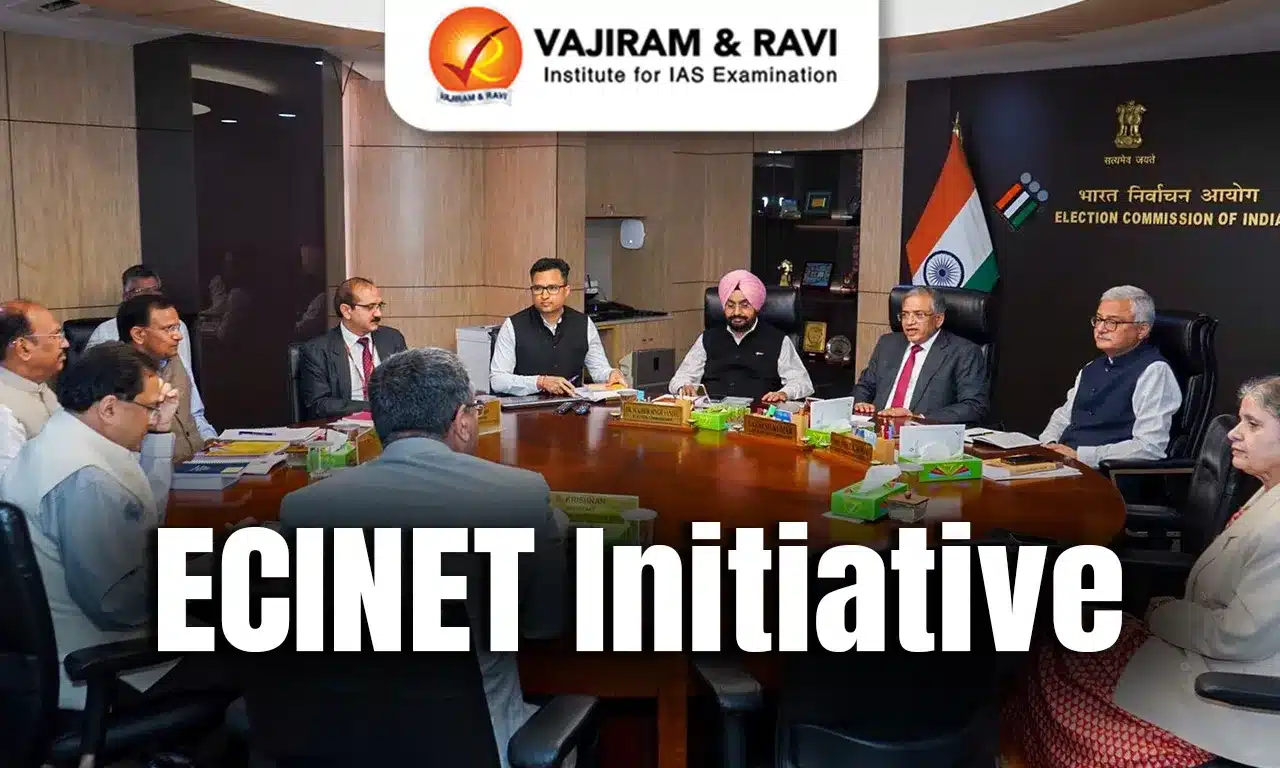ECINET Latest News
In a significant step towards streamlining electoral services, the Election Commission of India (ECI) will be launching a single-point digital platform called ECINET.
About ECINET
- It is a single-point digital platform being developed by the Election Commission of India (ECI).
- It is a new user-friendly digital interface for the electors and other stakeholders such as the election officials, political parties, and civil society.
- It will integrate and reorient over 40 of ECI’s existing mobile and web applications.
- ECINET will subsume existing apps like the Voter Helpline App, Voter Turnout App, cVIGIL, Suvidha 2.0, ESMS, Saksham, and KYC App.
- ECINET will have an aesthetic User Interface (UI) and a simplified User Experience (UX) by providing a singular platform for all electoral-related activities.
- This move is also designed to alleviate the burden of the users for downloading and navigating multiple apps and remembering different logins.
- ECINET will enable users to access relevant electoral data on their desktops or smartphones.
- The data on ECINET will be entered solely by the authorized ECI official.
- It would ensure that the data made available to the stakeholders is as accurate as possible.
- However, in case of any conflict, the primary data as duly filled in statutory forms will prevail.
- The data provided through ECINET will be strictly aligned within the legal framework established by the Representation of People Act 1950, 1951, Registration of Electoral Rules 1960, Conduct of Election Rules 1961, and instructions issued by ECI from time to time.
- ECINET is expected to benefit nearly 100 crore electors and the entire electoral machinery comprising over 10.5 lakh Booth Level Officers (BLOs), around 15 Lakh Booth Level Agents (BLAs) appointed by Political Parties, nearly 45 Lakh Polling Officials, 15,597 Assistant Electoral Registration Officers (AEROs), 4,123 EROs, and 767 District Election Officers (DEOs) across the country.
ECINET FAQs
Q1. What is ECINET?
Ans. A single-point digital platform by the Election Commission of India.
Q2. Who enters data into ECINET?
Ans. The data on ECINET will be entered solely by the authorized ECI official.
Q3. How many existing mobile and web apps of the ECI will ECINET integrate?
Ans. It will integrate and reorient over 40 of ECI’s existing mobile and web applications.
Source: ET
Last updated on June, 2025
→ UPSC Notification 2025 was released on 22nd January 2025.
→ UPSC Prelims Result 2025 is out now for the CSE held on 25 May 2025.
→ UPSC Prelims Question Paper 2025 and Unofficial Prelims Answer Key 2025 are available now.
→ UPSC Calendar 2026 is released on 15th May, 2025.
→ The UPSC Vacancy 2025 were released 1129, out of which 979 were for UPSC CSE and remaining 150 are for UPSC IFoS.
→ UPSC Mains 2025 will be conducted on 22nd August 2025.
→ UPSC Prelims 2026 will be conducted on 24th May, 2026 & UPSC Mains 2026 will be conducted on 21st August 2026.
→ The UPSC Selection Process is of 3 stages-Prelims, Mains and Interview.
→ UPSC Result 2024 is released with latest UPSC Marksheet 2024. Check Now!
→ UPSC Toppers List 2024 is released now. Shakti Dubey is UPSC AIR 1 2024 Topper.
→ Also check Best IAS Coaching in Delhi






















